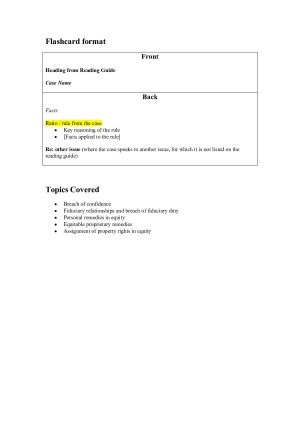Equity Flashcards for closed book exam - HD 88
Subject notes for Monash LAW3111
Description
Help! The equity exam is closed book, what on earth do I do!?! How on earth do you study for a closed book exam? How do you do well in a closed book exam? Given their rarity, closed book exams can be difficult to prepare for and will require a slightly different study technique—yes, some memorisation (unfortunately, you will need to spend a little bit of time mindlessly memorising things). The following flashcards break each case/piece of legislation down to its simple facts and a simple principle, which can easily be memorised. If you are able to cram these principles into your brain you should be able to answer exam questions well (and quickly). Memorisation is not the most exciting process, however, it is easier than it sounds—there are actually fewer pieces of information in the course than you think, the facts of the cases are easier to remember than you initially think, and it is surprising how quickly your brain can absorb information into its short-term memory (on the morning of the equity exam, I still had around 20% cases that I was unsure of—it only took a couple of hours of going through the cards to get on top of them). I wrote each case on a 6” x 4” index card (from Officeworks), using a different colour card for each of the 5 topics. Whether the exam is weeks or months away, or even just a few days away, creating flash cards like these will be one of the most valuable things you can do to prepare for the closed book exam. I’ve used this technique for each of the 4 closed book exams I have done at law school and managed to HD them all. You can also do it! Hope you find the notes helpful and best of luck for the exam! Topics included: • Breach of confidence • Fiduciary relationships and breach of fiduciary duty • Personal remedies in equity • Equitable proprietary remedies • Assignment of property rights in equity
Monash
Semester 2, 2018
47 pages
14,219 words
$29.00
2
Campus
Monash, Clayton
Member since
December 2012
